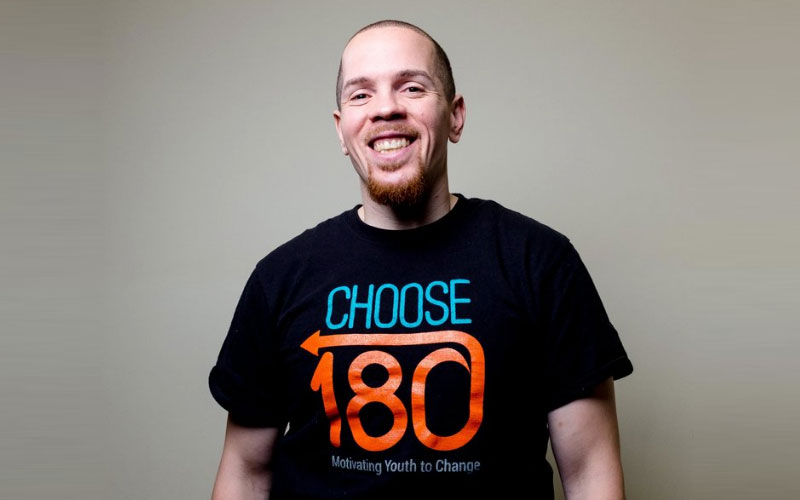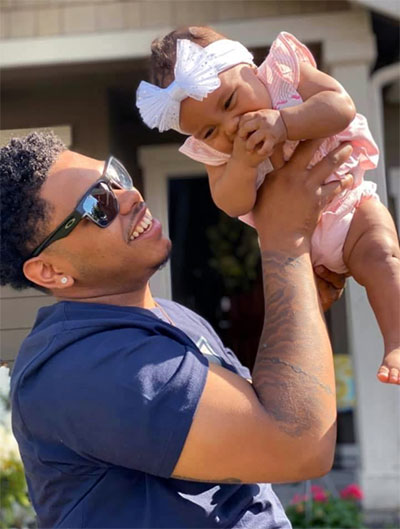
Sean Goode is the executive director of Choose 180, an organization that helps youth bypass most of the traditional justice system. (Photo courtesy of Choose 180)
PHOENIX – Iziah Reedy was waiting for a court date for possessing a gun and a stolen car – instead he got a phone call inviting him to a half-day workshop that would have him meet inspiring mentors and see his charges dropped.
“This is impossible,” Reedy said he remembers thinking at the time. “I thought I was definitely getting set up.”
Reedy, 16 at the time of the 2016 incident, had been pulled over by a cop in front of his little sister’s school in the perpetually cloudy Seattle-suburb, Federal Way, Washington. She was sick, so he went to deliver her soup in a stolen vehicle.
When he saw the cop approaching his driver’s side window, Reedy said he thought his fate was sealed, the trajectory of his life determined.
“I already saw my life going down the drain,” he said. “(It was) gonna pertain to me being out in the streets, even if it involved me being in and out of jail.”
Iziah’s phone call came from Choose 180, a Seattle-area organization committed to creating better futures for kids who come in contact with the juvenile justice system.
The organization was launched in 2011 with the King County prosecuting attorney, with an explicit goal to address racial disparities in the juvenile justice system. Its workshop program takes the place of formal charges being filed, sparing kids the consequences of a blemished criminal record. In 2019, the program diverted nearly 400 young people away from the formal justice system.
According to Sean Goode, Choose 190’s executive director, 68% of the kids they serve are “Black or brown.” According to government data, King County – officially renamed in 2005 to honor Martin Luther King Jr. – is just 15% Black and Hispanic.
“We’re working with young people who are coming to a program that is centered in their experience, not centered in white-dominant culture,” he said.
Young people up to the age of 24 who commit misdemeanors, outside of sexual and domestic offenses, can go to a half-day Choose 180 workshop and settle their case before the court gets involved. Choose 180 is an offramp on the road to juvenile incarceration that allows kids to bypass most of the traditional justice system – one which Goode feels is too focused on kids’ past, not their potential.
“The premise (judges and prosecutors) operate out of is that accountability needs to be to what somebody’s done,” Goode said. “And not to what somebody can be.”
Today, at 20 years old, Iziah is a barber with his own clients. Sometimes he cuts Goode’s hair.
For Goode, his program is not just an offramp, but a launching pad, providing opportunities for a better, more fulfilling future.
“We don’t create solutions for young people, we create possibilities with young people,” Goode said.
Adam Fine, a professor in Arizona State University’s School of Criminology and Criminal Justice, is one of many researchers analyzing data collected from the Crossroads study – an ongoing operation launched in 2011 that seeks to understand the effects of various consequences kids receive after becoming involved in the juvenile justice system.
They looked at three groups of kids who had engaged in similar illegal behavior. One had no interaction with the justice system – their crimes went undetected or otherwise ignored. Another group had their cases handled “informally,” i.e. lenient probation or diversion programs like Choose 180. And the final group received the most severe consequences, like incarceration in a detention facility or an ankle monitor and strict probation requirements.
Fine and his colleagues found that after six months, the “no-contact” group’s illegal behavior remained unchanged, while the lenient group’s decreased – and the strict group’s increased.
University of Washington psychologist Sarah Walker recently published a study that echoed Fine’s findings: Holding kids in detention prior to their trial made them significantly more likely to reoffend in the future. The reason for this, she and others hypothesize, is because in detention, kids meet and befriend others involved in criminal activity.
“It reinforces an identity for the youth that they’re a bad kid,” she said.
Choose 180 aims to do the opposite. According to its 2019 Annual Report, 87% of its workshop participants do not reoffend.
Goode said he thinks of Choose 180 as an emergency room.
“We’re triaging (young people), helping them get well enough and then referring them out to primary care and specialty practitioners to help them sustain their commitment to change,” he said.
The diagnoses are unique to the kids’ individual needs. Choose180 helps kids with mental health problems set appointments with behavioral specialists and others get jobs at local businesses. Goode remembers one young person who was committing crimes to make money to help his parents pay for his brother’s baseball league. Choose180 helped pay the bill.
Goode’s parents suffered from mental health problems and his brother went to juvenile prison for murder. Most of the staff at Choose 180 has, like Goode, overcome extraordinary hardships.
This, he said, gives them “the ability to connect on a real level and say, ‘I get it.’ Not just I get it because you said it but I get it because I lived it.”

Iziah Reedy’s experiences in Washington and Arizona exemplify differences in the juvenile justice system. (Photo courtesy of Iziah Reedy)
The program has received national attention for its success, and Goode said he spends a lot of time traveling and talking about their approach. Currently, he and his colleagues are in communication with advocates in Utah looking to implement a similar program.
When Reedy attended the Choose 180 workshop, he said he heard from people who had “way harder life experiences” than he had, and “overcame (them), and they’re doing great today,” which humbled and inspired him. Reedy, who is Hawaiian, said he no longer felt his life must be “going down the drain.”
Because Reedy was also caught with a gun in the stolen vehicle, he was expelled. Choose 180 helped him get back in school, graduate, and even helped pay for his tuition for barber school. He’s since served on a government council for juvenile justice, participated in a program for young leaders in his community, and spoken to other kids in his similar situation – inspiring some, he said, to pursue cutting hair like he did.
Before Choose 180, Reedy said the streets were all he knew. They simply showed him he could use the ingenuity and motivation he learned there to succeed in business.
“Cutting hair was similar to me being in the streets,” he said. “It was just more professional and it was more legal.”
Reedy’s road to personal reform has been a winding one, though. He said at one point after high school, things got slow at the barber shop, and he temporarily turned back to a mainstay of his former life-on-the-streets behavior: shoplifting for extra cash.
While on a vacation with friends in Phoenix, he was arrested in a shopping mall for stealing shoes. He said he spent a couple days in jail and the ensuing months flying back and forth from Seattle to Phoenix to attend to the case, which was constantly complicated by shifting prosecutors and plea deals.
He said he felt he was “getting juggled around like a toy” by the justice system and realized that its problems lay deeper than just law enforcement. In King County, he was sent to a seminar after getting caught with a gun. In Phoenix, he was sent to jail for getting caught with stolen sneakers.
“We shouldn’t have to spin the wheel” he said, comparing the court system to a gambling game.
Despite his frustrations, he said he’s back on track, reinvigorated by a new addition to his family.
Earlier this year, Reedy became a father when his girlfriend had a baby girl, Anuhea, a Hawaiian name they gave in tribute to his mother’s family. Reedy’s father wasn’t around when he was a kid. Now, he said his No. 1 goal in life is to be a great dad.
Beyond that, his priorities are simple: “enjoying life and owning my own business.”
This is the kind of future the staff at Choose 180 sees in the young people they seek to help – even when they don’t see it themselves.
“We’re not fixated on behavior change,” Goode said. “We’re fixated on helping young people heal and become more of who they are.”
This story was produced in collaboration with the Walter Cronkite School-based Carnegie-Knight News21 “Kids Imprisoned” national reporting project scheduled for publication in August. Check out the project’s blog here.





0 General Document comments
0 Sentence and Paragraph comments
0 Image and Video comments
New Conversation
Hide Thread Detail
In particular, I’m interested to see how threading works.
New Conversation
Hide Full Comment
New Conversation
New Conversation
New Conversation
New Conversation
Hide Thread Detail
New Conversation
New Conversation
New Conversation
Reaching out to individuals when they are in the most need is wise, this convinces many when at other times they might not agree to an alternative program at all.
New Conversation
Hide Full Comment
New Conversation
Hide Thread Detail
This is a serious problem because it involves the behavior of members of our society. It also has the potential to ruin the lives of kids who made a mistake.
New Conversation
Hide Full Comment
I think this problem is a problem that isn’t often talked about. I think that if ignored could have negative results on our society in the long run
New Conversation
Hide Full Comment
New Conversation
Hide Thread Detail
New Conversation
Choose 180 provides both a more positive way to teach the juveniles about how to behave better and also an easy and precise way to clean up their criminal record.
New Conversation
Hide Full Comment Hide Thread Detail
The program seems to be working because of its results, but there is no confirmed method behind it. It’s nothing radical; just therapy.
New Conversation
Hide Full Comment
New Conversation
New Conversation
to have adovocates the inequality that is occurring among police and minorities now, this and many more programs in ALL states need to be put into place to safeguard against more “mistakes” happening that hurt others.
New Conversation
Hide Full Comment
New Conversation
It is also important to note that people who have committed sexual and domestic offenses cannot be involved in the organization. As great as it would be to save every good person on this earth, it’s not possible. The organization must draw a clear line when it comes to who they will help and who they will not.
New Conversation
Hide Full Comment
These stories are more of what we need to hear in the news to show how programs like this are a solution to existing problems.
New Conversation
Hide Full Comment
New Conversation
Hide Thread Detail
A consequence of this solution could be giving irreformable bad kids too much freedom and credit for doing something horrible. However, most of their participants do not commit further offenses after the program.
New Conversation
Hide Full Comment
I think here the author shows a solution but not an actual one more of an indirect one.
New Conversation
Hide Full Comment
This definitely shows a more long term goal rather than a short term fix, which is beneficial to promoting this program.
New Conversation
Hide Full Comment
General Document Comments 0

